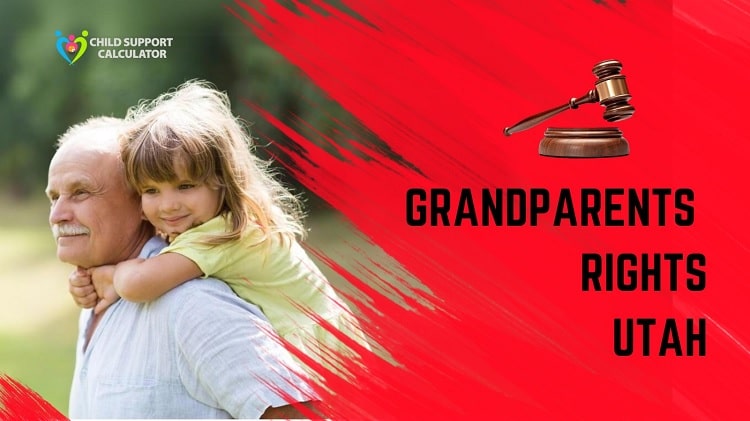Grandparents Rights In Maryland
More grandparents are taking an active role in the upbringing of their grandchildren, whether by choice or need. When parents become incompetent to care for their children, divorce occurs, or one or both parents pass away, a grandparent may be forced to file a custody case on their behalf.

A request for court-ordered visitation may be justified if the grandparents’ relationship with the children’s parents has become tense, possibly culminating in the parents refusing the grandparents any contact with the children.
This is especially true if there has been a close interaction between the grandparents and the grandchildren. This article explains grandparents’ rights in Maryland.
Grandparent Visitation Rights In Maryland
Grandparents rights in Maryland and visitation with grandkids are only mentioned briefly in Maryland’s statutes. If it is in the child’s best interests, the Act grants the judge the ability to approve “reasonable” visitation.
The Act does not specify how to determine a child’s best interests, but the court has noted that it presumes that parents act in the best interests of their children. A grandmother requesting visitation must either establish that the parent is unsuitable or that “extraordinary circumstances” exist in which the child would be harmed if the grandparent was denied visitation.
The grandmother requesting visitation bears the “burden of proof” (obligation to present sufficient evidence) of demonstrating that the planned visiting period is in the child’s best interests, taking health, safety, and welfare into account.
Judges naturally presume that parents are acting in their children’s best interests, and they place a high value on their preferences for who gets to spend time with them. You must overcome this “presumption” if the parent of your grandchild objects to your visits (legal assumption).
To begin, you must demonstrate that the parent is “unfit” (unable to make competent parenting judgments) and/or that the kid would be harmed if the court-ordered time were not granted. The alleged harm must be significant and concrete, such as abuse, neglect, or the threat of emotional distress if the child is blind.
Suppose you successfully overcome the parent’s preference presumption. In that case, you must show that regular contact with you is in the child’s best interests based on any facts relevant to the child’s welfare.
Grandparent Custody Rights In Maryland
According to the United States Supreme Court, people have the fundamental right to raise their own children. As a result, anyone seeking to take away a parent’s right to raise a kid must demonstrate a high standard of proof that the parent is unsuitable to the parent.
The court presumes that the parent is the best person to raise his or her kid, but exceptional circumstances, such as chemical dependency, neglect, abuse, or mental illness, might overrule this presumption.
As guardians of children, Maryland courts have declared that they must act in the best interests of the child and will remove the child from his or her parents if it is in the child’s best interests.
In obtaining custody of a child, Maryland’s rules provide no favour to grandparents over other third parties; there are just “parents” and “third parties” in custody cases. When assessing the circumstances that justify removing a kid from his or her parents, the court will consider the closeness of the child’s relationship with the third party requesting custody.
The court will also consider the following factors:
- The period the youngster has been separated from his or her biological parents.
- The age of the child at the time the third party took care of him or her.
- A change in custody may have an emotional impact on the child.
- The amount of time that had passed since the parent attempted to retrieve the child.
- The intensity and sincerity with which the parents wish to have a child.
- The stability and predictability of the child’s future in the parent’s custody.
Grandparent Visitation Rights Process In Maryland
Grandparents who want custody of their grandkids or visitation with them must file a ‘petition’ with the court. The petition must explain why it is in the children’s best interests to be in your care or spend time with you as a grandparent.
The court may appoint a ‘Best Interest’ attorney to act as the children’s legal representative. This attorney will evaluate your grandchildren’s general living environment, any potential benefits of having a relationship with you, and if ending the grandparent-grandchild contact will be damaging to their well-being.
The Best Interest attorney may consult with your grandchildren’s therapist, teachers, and anybody else who may know something about their overall well-being in order to make this assessment.
Depending on their age and maturity, the attorney may also speak with your grandchildren to learn how they feel about their relationship with you and what they want to happen in the future. The attorney can tell the court what your grandchildren want in terms of custody and visitation and give their opinion on what is best for them.
The grandparents bear the ‘burden of evidence’ in each grandparent custody or visitation case, demonstrating their legal claim to court-ordered time with their grandchildren. This means you must provide the judge hearing your case with adequate proof to satisfy the legal requirements for custody or visitation.
When making a judgment about your grandkids, the judge must consider their overall best interests. One of our firm’s knowledgeable grandparents’ rights in Maryland attorneys knows how to obtain the evidence needed to meet this burden of proof and will represent you in all court hearings.
FAQs
Maryland law allows grandparents to ask the court for visitation rights. Grandparents can also ask for custody. If you are the child’s grandparent asking for custody or visitation, you will be treated as a third party unless you can prove that you are a “de facto” parent.
The first step is to notify everyone concerned and submit a “petition” (formal written request) in court for custody and visitation arrangements for your grandchild. Your recommended timetable for court-ordered visits will be described in your petition.
Grandparents do not have automatic rights to see their grandchildren under the law. Parents can opt to keep their children away from grandparents in almost every scenario.
When parents are unable to care for their children due to unanticipated circumstances, grandparents can gain temporary custody of their grandkids. Typically, grandchildren will begin living with their grandparents in this situation.
Join advocacy groups for grandparents’ rights, and research your legal visitation rights. If you can, try to mend the shattered friendship. Send cards and letters to your grandchildren to keep in touch. Simply keep any dialogue in a loving and light tone.







